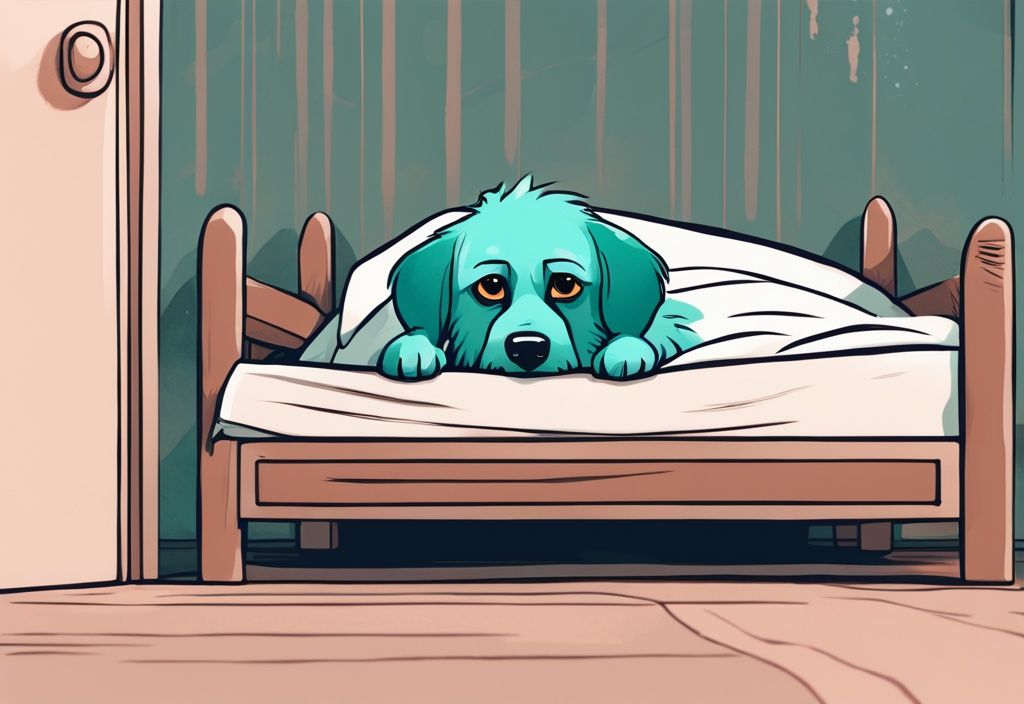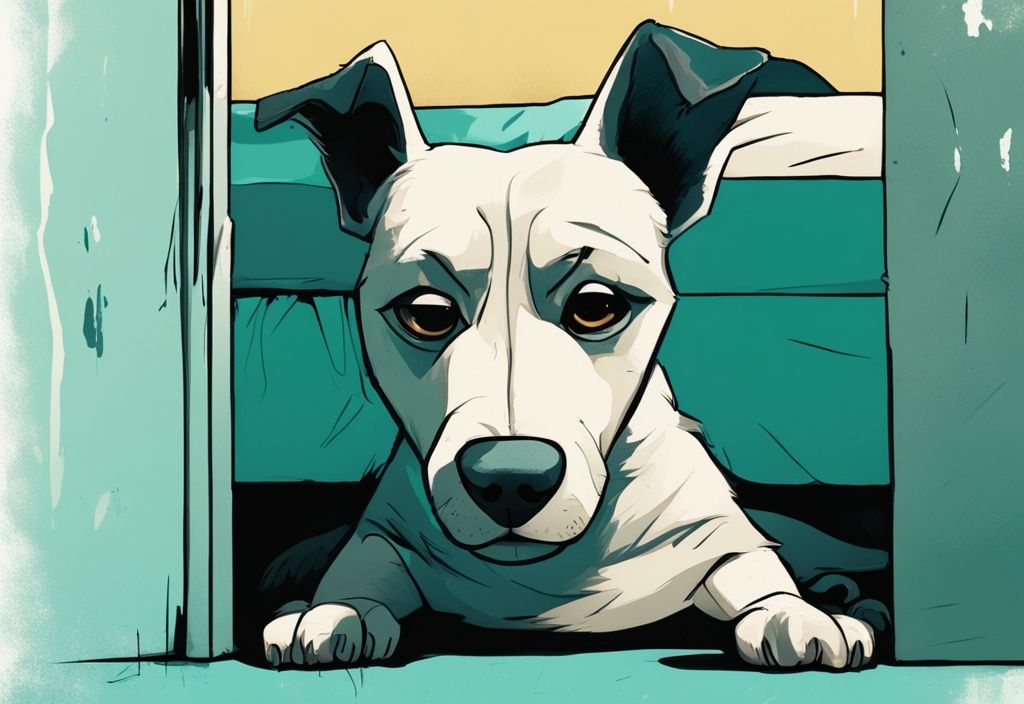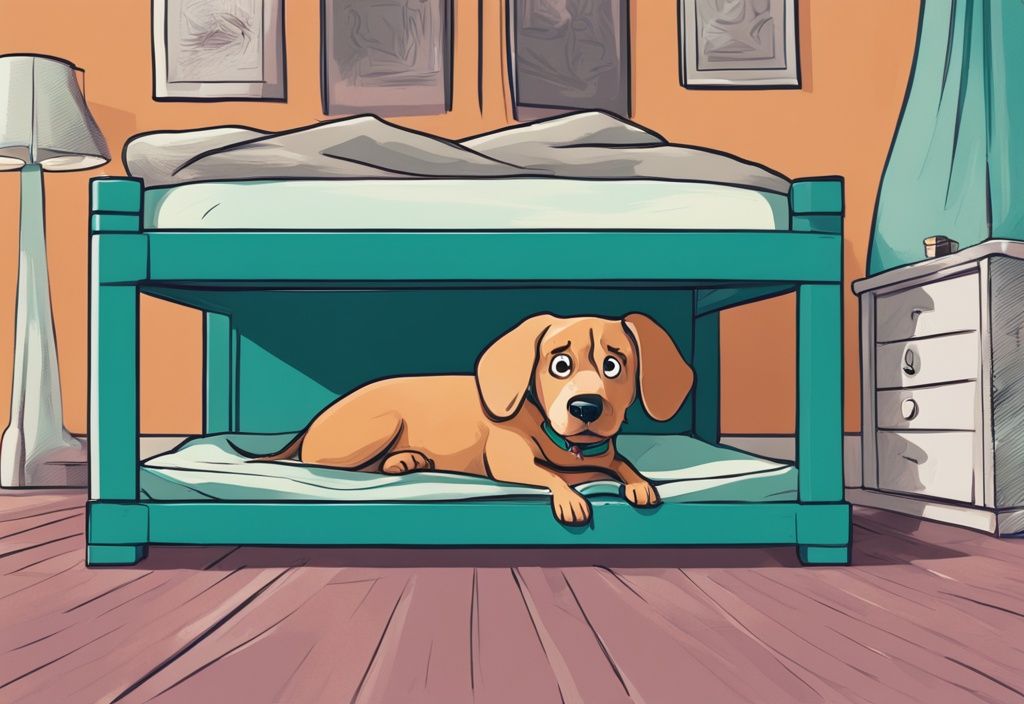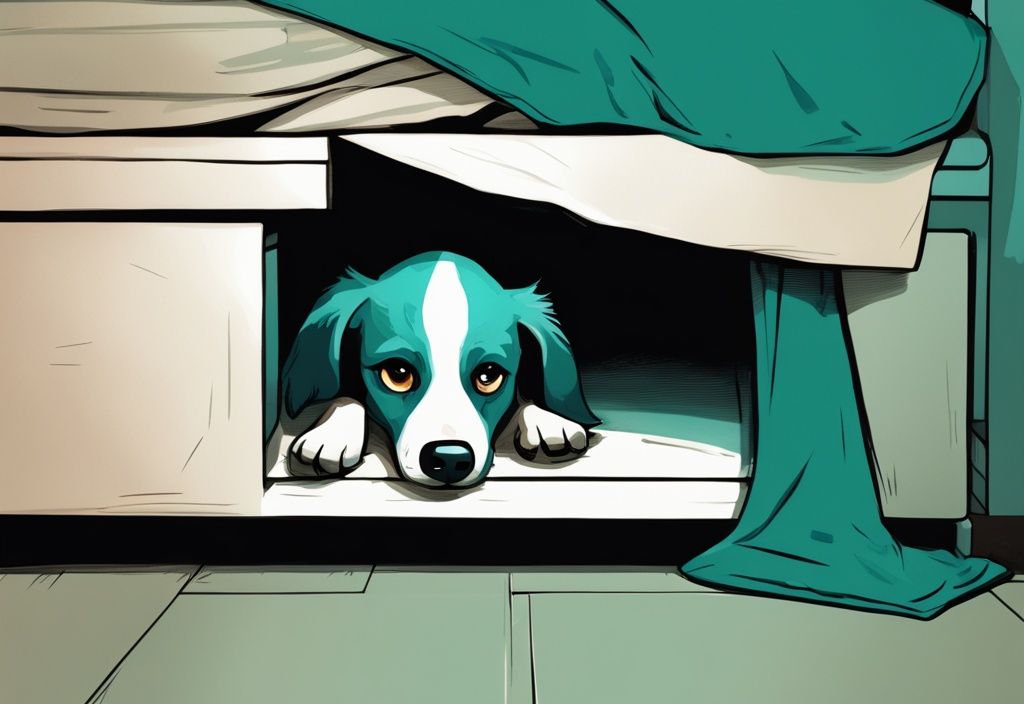Ever caught your normally outgoing tail-wagger trying to morph into the boogey-dog under your bed? Well, just like us, dogs also have days or moments they’d rather lay low. If your four-legged best friend has started a sudden game hide-and-seek, you’re probably wondering, ‘why is my dog hiding under the bed all of a sudden?’
In this chewy piece of writing, we’re figuring out the possible hide-n-seek triggers – from anxieties to tummy troubles or just a quest for a snooze station. Come, let’s delve into understanding these behavioral quirks to help our cuddle buddies feel more secure again!
Whether it’s crafting a cozy corner or setting a date with Dr. Doggy, get ready to unravel the mystery behind your pet’s newfound sanctuary and how to make them feel waggy-tail-happy again.
Understanding Your Dog’s Behavior: Why They’re Suddenly Hiding Under the Bed?
Ever found your furry friend suddenly hiding under the bed and wondered why? Let’s dive into some of the possible reasons, exploring anxiety, noise sensitivity, and health concerns that might cause this behavior.
The Connection Between Anxiety and Under-Bed Hiding
Dogs often seek a calming environment, such as under the bed, when they experience anxiety or fear. This behavior can closely resemble den-seeking, which provides them with a sense of security. Recent traumatic experiences may have exacerbated this anxiety, making your dog more prone to hiding under the bed.
Additionally, dogs may choose this secluded spot to find comfort and privacy away from overwhelming stimulation and human interaction. It’s also important to consider that as dogs age, they might exhibit behavioral changes like cognitive dysfunction syndrome, which can lead to abnormal actions, including hiding.
Noise Sensitivity: Does Your Dog Hide When It’s Loud?
Noise sensitivity is a common reason why dogs suddenly hide under the bed. Loud sounds such as thunderstorms, fireworks, or even household noises can startle them. Under the bed offers a protected, den-like space where they feel safe from these intrusive noises.
To help reduce their anxiety during such events, it can be beneficial to distract your dog with playtime, engaging activities, or soothing white noise. These tactics aim to divert their attention and lessen stress, making loud events more bearable for your pet.
Is Your Dog Hiding Under the Bed Due To Illness or Injury?
When a dog is hiding under the bed all of a sudden, it might indicate discomfort, illness, or injury. Dogs often isolate themselves when they don’t feel well, seeking a safe place to recover.
Observing additional symptoms such as loss of appetite, lethargy, vomiting, gastrointestinal distress, or excessive vocalizing can help identify potential health issues. If these signs are present, it’s crucial to consult a veterinarian to ensure proper diagnosis and treatment.
Identifying and addressing the cause of discomfort is essential for your dog’s well-being and to prevent prolonged hiding behavior.

Recognizing Warning Signs: When Should You Be Concerned?
When you’re scratching your head and thinking, “why is my dog hiding under the bed all of a sudden,” it’s vital to pay attention to potential warning signs. Understanding these signals can be the first step in addressing what’s bothering your furry friend.
Common Signs Your Dog May Be in Distress
Finding out that your dog is suddenly hiding under the bed can be quite puzzling.
But don’t worry, there are some telltale signals that can help you figure out if your doggo is in distress. Have you noticed your pup shivering for no apparent reason? It’s one of those clear signs that something is off.
Another thing to watch out for is excessive panting—especially when your dog hasn’t been exercising or it’s cool indoors. Drooling more than usual? Yep, that could be a red flag, too. Frequent hiding, not just under the bed but in other nooks and crannies, is another sign that might mean your dog is feeling anxious or stressed.
And what about when your usually sociable pooch suddenly avoids family members? That’s definitely a sign worth paying attention to. Lastly, a switch from calm to aggressive behaviors, or even lethargy, should make you take a closer look. These indicators are your pup’s way of saying, “Hey, something’s not right!”
Spotting Medical Symptoms: When to Consult a Vet
Trying to figure out “why is my dog hiding under the bed all of a sudden?” might lead you to consider medical issues. Some symptoms scream for a vet visit, and knowing these can make all the difference.
If your dog’s appetite has taken a nosedive, that’s a big deal. Illness or discomfort can cause your pup to lose interest in food. Lethargy is another alarm bell; a lack of enthusiasm for their favorite games or walks is a clear sign of trouble.
Disengagement—like ignoring your calls or showing no interest in your presence—can also point to distress. And don’t ignore physical symptoms such as vomiting, gastrointestinal issues, or constant whining or barking for no reason.
These behavioral changes, especially when persistent, require a vet’s expertise. Early identification and treatment can stave off more serious complications, keeping your beloved furball healthy and happy.
Helping Your Dog Feel Secure: Solutions to Prevent Under-Bed Hiding
Creating a sense of security for your dog is crucial when you’re addressing the behavior of hiding under the bed all of a sudden. One effective strategy is to provide an alternative safe space.
Creating a Safe Space: Alternatives to Hiding Under the Bed
Imagine if we could transform that mysterious, dark space under your bed into an inviting sanctuary elsewhere. Setting up a cozy crate or a quiet, designated area for your dog offers them a retreat without the dust bunnies. This new spot should be decked out with soft bedding and toys that smell like home. Have you ever heard of dog pheromone products? They mimic the comforting scents dogs naturally produce, making this haven even cozier for your furry friend. Ensure it’s away from all those pesky disturbances – no loud noises or heavy foot traffic – to make it a true sanctuary.
Dog Training Techniques to Reduce Anxiety and Fear
You wouldn’t believe how much training can help! Gradual desensitization to loud noises is a game-changer. Start by playing recordings of thunderstorms or fireworks at a whisper-quiet volume and slowly notch it up. Reward your pup every time they stay calm – it’s all about building that brave heart. And remember, yelling or punishing when they hide? It’s a big no-no. It only amps up their fear. Instead, sprinkle in some positive reinforcement when your dog manages to stay calm. A treat here, a belly rub there – it adds up to a happier, braver pup.
When and How to Seek Professional Help
If all else fails and your dog is still playing hide-and-seek under the bed, it’s time to call in the pros. A vet visit is a must if you think illness or injury might be at play – you don’t want to miss that. Once the vet gives the all-clear, professional dog behaviorists or trainers can step in. Trust me, they’re like doggy wizards. They’ll create customized training programs to ease your dog’s anxiety and help them ditch that under-bed hiding habit. Experts can be just the support you need to unravel why your dog is hiding under the bed all of a sudden and guide you through every step of the way.

Preventing Future Hiding Incidents: Stabilize Your Dog’s Environment
Ensuring a stable environment for your dog is crucial to prevent them from hiding under the bed suddenly. Implementing consistency and calm encouragement can work wonders for their anxiety levels and overall behavior.
The Benefits of Rewarding Calm Behavior
Ever noticed how your dog lights up when they get a treat for being calm? Rewarding calm behavior can build their confidence and reassure them that tranquility is a good thing. Think of it as giving high-paws for being the chillest pup on the block.
Positive reinforcement doesn’t just make your dog feel good; it helps them associate calmness with good outcomes, reducing anxiety and those sudden moments when they decide to make under-the-bed their new lair. Plus, it makes understanding why is my dog hiding under the bed all of a sudden a tad easier when you keep track of their behavior patterns.
Keeping up the consistency in rewarding calm behavior also acts like a behavioral booster. The more immediate and appealing the reward, the better your dog will learn that staying calm is pawsitively awesome!
Maintaining Routine to Increase Your Dog’s Confidence
Dogs are creatures of habit and they thrive on routine. Imagine knowing exactly when you’ll get your meals, your walks, and your playtime—sounds comforting, right? That’s exactly how your dog feels too.
Having a consistent daily routine gives your dog the predictability they crave. It turns their world into a stable haven, seriously lowering stress levels and curbing anxiety-induced behaviors like suddenly hiding under the bed. A regular schedule filled with walks, meal times, and play sessions can make your furry friend feel they have a grip on their environment.
When your dog knows their needs will be met regularly, it boosts their confidence and reduces the triggers that might lead to darting under the bed. Setting and sticking to this routine can work wonders in answering the big question: why is my dog hiding under the bed all of a sudden?
By integrating these practices into your dog’s life, you’ll create a more secure and stable environment. This ultimately reduces anxiety and those unexplained hiding episodes.
So, sprinkle in some routine, mix it with oodles of positive reinforcement, and you’ll pave the way for a happier, more confident pup ready to take on the world—well, at least the living room! 🐾
Frequently Asked Questions: Alleviating Your Concerns About Your Dog’s Hiding Behavior
Is your fur baby suddenly hiding under the bed, and you’re scratching your head, wondering why? This section dives into common concerns and offers solutions to help your dog feel safe and sound.
Should I Be Worried If My Dog Suddenly Starts Hiding Under the Bed?

In a word, yes. If your dog, who usually loves to play fetch or snuggle up next to you, starts hiding under the bed, it could be a sign of anxiety, illness, or something in their environment causing them stress. Have you moved furniture around? Or perhaps introduced a new family member? If your pet is recovering from an injury, you might be considering options like FHO surgery for your dog to improve their mobility and quality of life. These changes can be significant for dogs. If Max, my Border Collie, suddenly became a bed hermit, I’d certainly be keeping a close eye on him. If the hiding continues, it’s best to book a vet appointment to rule out any health issues.
How Can I Tell if My Dog Is Hiding Due To Illness or Injury?
Spotting the signs can feel like playing detective. Look out for a change in appetite—maybe your pup isn’t diving into their bowl of kibble like usual. Lethargy, vomiting, gastrointestinal distress, or even more vocalizations than normal are red flags. Behavioral changes, such as increased aggression or avoiding you, can also signal that something’s off. For a thorough check-up, nothing beats a vet’s trained eye. I remember Whiskers, my cat, showing these signs once, and it turned out she had an upset tummy. Better safe than sorry!
How Do I Comfort My Dog During Loud Events Like Thunderstorms?
Ah, thunderstorms—the bane of many a pup’s existence. During these noisy moments, keep Max occupied with engaging activities, toys, or even some white noise to drown out the thunder. Gradual desensitization can work wonders. Play recordings of thunder at a low volume and reward calm behavior. Over time, increase the volume. Think of it like slowly teaching your dog that thunder is just another background noise, like the dishwasher humming away.
Is It Ok To Let My Dog Hide Under the Bed If It Makes Them Feel Safe?
Creating alternative safe havens is a great idea. While the occasional hideaway session under the bed can be fine, frequent hiding indicates deeper issues that need addressing. Set up cozy and secure spots for your dog—a crate with comfy bedding or a quiet corner can do wonders. This way, they have multiple places to retreat to, making them feel more secure in their environment. If you’re concerned about your dog’s health, you might be wondering how much a dog CT scan costs to ensure their well-being. For Max, a well-placed crate with his favorite blanket is his go-to stress-buster spot.
Conclusion
Understanding why your dog is hiding under the bed all of a sudden is crucial for ensuring their well-being. This behavior could stem from anxiety, noise sensitivity, illness, or injury. Recognizing these triggers enables you to address the root cause effectively.
Creating a stable, supportive environment is vital for your dog’s mental and physical health. Offering alternatives to under-bed hiding, such as a cozy crate or a designated quiet area, can help your dog feel safer and more secure.
Consistently rewarding calm behavior and maintaining a routine play significant roles in reducing anxiety and promoting confidence. Think about it: wouldn’t you rather snuggle up somewhere comfy and quiet if you were feeling spooked? Your dog is no different!
If your dog’s hiding behavior persists or is accompanied by signs of distress, consulting a veterinarian or professional dog behaviorist is essential. Professional assistance can provide tailored strategies to manage anxiety and ensure your dog’s overall well-being.
Ultimately, a deep understanding of your dog’s hiding behavior, combined with a supportive and stable environment, can significantly improve their quality of life. Ensuring they feel safe, loved, and happy will not only ease their anxiety but also bring you closer together. And isn’t that what being a pet parent is all about?
